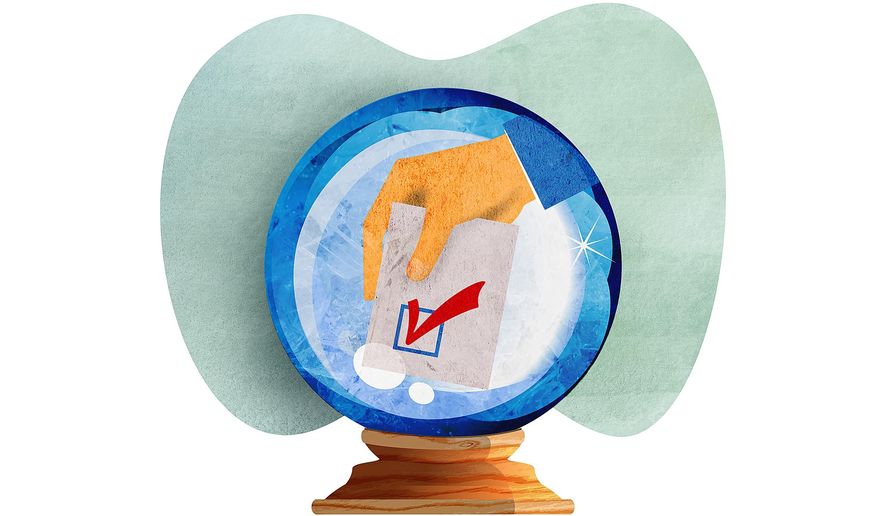OPINION:
A few weeks ago, writing in these pages, I observed how the Baltimore journalist and critic H.L. Mencken would have enjoyed the current show (i.e., obscenity) before us. It is a roller coaster of a presidential election that is shaking the American psyche to such a degree that the country seems to be on the edge of a nervous breakdown. But what I failed to mention — and what many journalists have failed to observe in their recycling of the usual Mencken quips every four years — is Mencken’s ferocity in his analysis of democracy.
Nowhere else is this more evident than in one of his most important works, “Notes on Democracy,” which the critic Edmund Wilson compared to “a sort of obverse of Whitman’s ‘Leaves of Grass.’ ” The book is worth revisiting, even 90 years after its publication. Here Mencken writes on the art of the demagogue, who plays on the emotions of the population. They want “heroes to worship,” and “rough entertainment suitable to their simple minds.”
The politics of the masses, writes Mencken, is one of envy. Nursing grievances in grim wastelands, where jobs are scarce and progress has long passed him by, the average mob-man “hates the plutocrats of the cities, not only because they best him in the struggle for money, but also because they spend their gains in debaucheries that are beyond him.” Moreover, “What is worth knowing, he doesn’t know and doesn’t want to know; what he knows is not true. The cardinal articles of his credo are the inventions of mountebanks; his heroes are mainly scoundrels.”
Such voters are “constantly bamboozled and exploited by small minorities of their own number, by determined and ambitious individuals, and even by exterior groups,” he wrote. “The business of victimizing them is a lucrative profession … a delicate and lofty art.”
Ambitious and adept demagogues, Mencken observed, “can hear the murmur of mob dissent even before they are conscious of it themselves.” Skillful at gaining popularity, he said, such politicians know how to arouse the fears of the mob and awaken its hatreds. “He holds them by his shrewd understanding of their immemorial sentimentalities; around him clusters all the romance that used to hang about a king.”
Sound like any candidate you know?
At the other end of the electoral spectrum is the enlightened voter, predisposed toward liberty, on guard to keep his freedom from eroding under unscrupulous politicians. (You know the type. Politicians, as Mencken observed, who will “embrace any issue, however idiotic, that will get him votes and … sacrifice any principle, however sound, that will lose them for him.”)
For Mencken, independence defines the superior man. Regardless of race or social background, the superior man is simply the man of honor: unfrenzied and tolerant of new ideas. Unfortunately, he is in the minority. Any political candidate who embraces these same characteristics is rare, and is invariably shouldered out of public life.
Sound like any contenders you wish were running?
When it comes to the art of politics, Mencken said, we are thus left with two choices: “The demagogue is one who preaches doctrines he knows to be untrue to men he knows to be idiots. The demaslave is one who listens to what these idiots have to say and pretends that he believes it himself.”
Mencken’s analysis is especially timely in 2016, where heated rhetoric, economic and class distinctions, fear and scapegoating are being played out in a major way. Whatever the verdict come Tuesday, you can be sure there will be violent discontent in one form or another. One of its tamer byproducts, I predict, will be a resurgence of bitter family feuds around the Thanksgiving table, reminiscent of election year 2000.
“Notes on Democracy” remains a significant contribution to the libertarian debate, and it is little wonder Mencken’s wisdom appears in the popular twitter account, @HLMencken.bot, currently enjoying a growing number of devotees as the country — indeed, the world — careens toward Nov. 8.
So that you don’t think Mencken anti-democratic or un-American, I will leave you with one last Mencken quote. It may provide a glimmer of hope that may satisfy even the most cynical pessimist among us: the independent citizen, on guard and on edge, gloomily nursing his Scotch as he listens to the talking heads having their own nervous breakdowns on Fox News or CNN.
Note: Mencken’s astute observation that even the mobs “have the means in their hands to stop the obscenity whenever it becomes intolerable. Now and then, raised transiently to a sort of intelligence, they do put a stop to it.”
But how this will play out at the voting booth, I am sorry to say, is anyone’s guess.
• Marion Elizabeth Rodgers is the biographer of “Mencken: The American Iconoclast” and editor of Mencken’s “Notes on Democracy.”




Please read our comment policy before commenting.